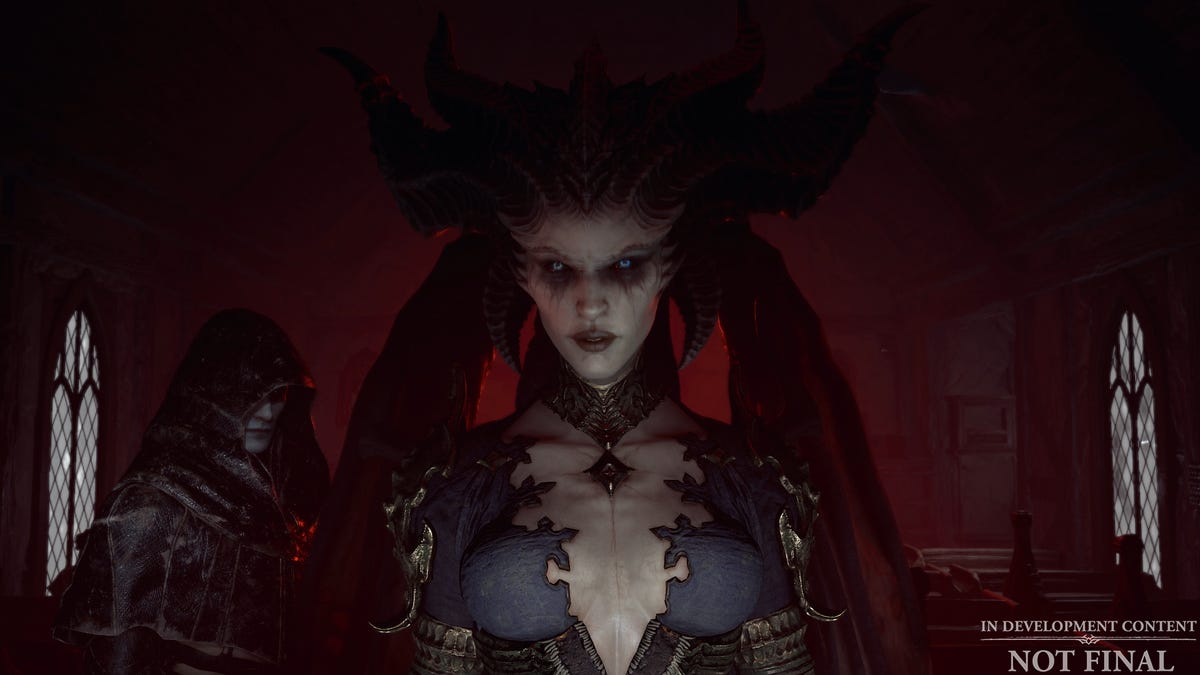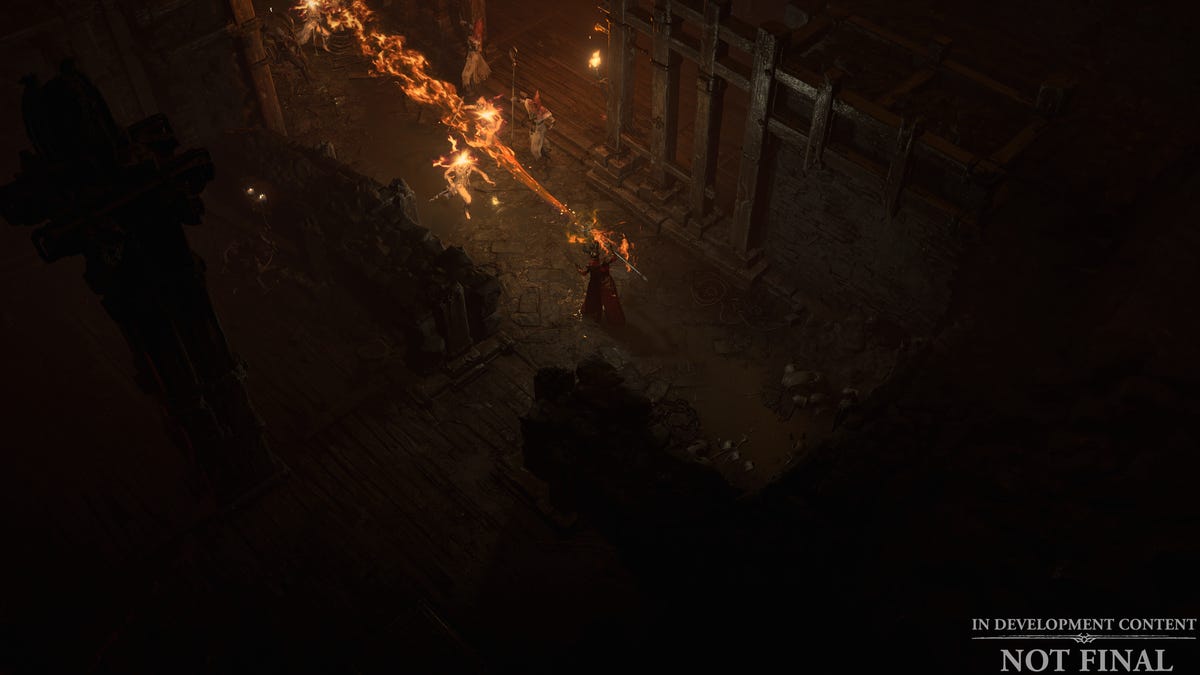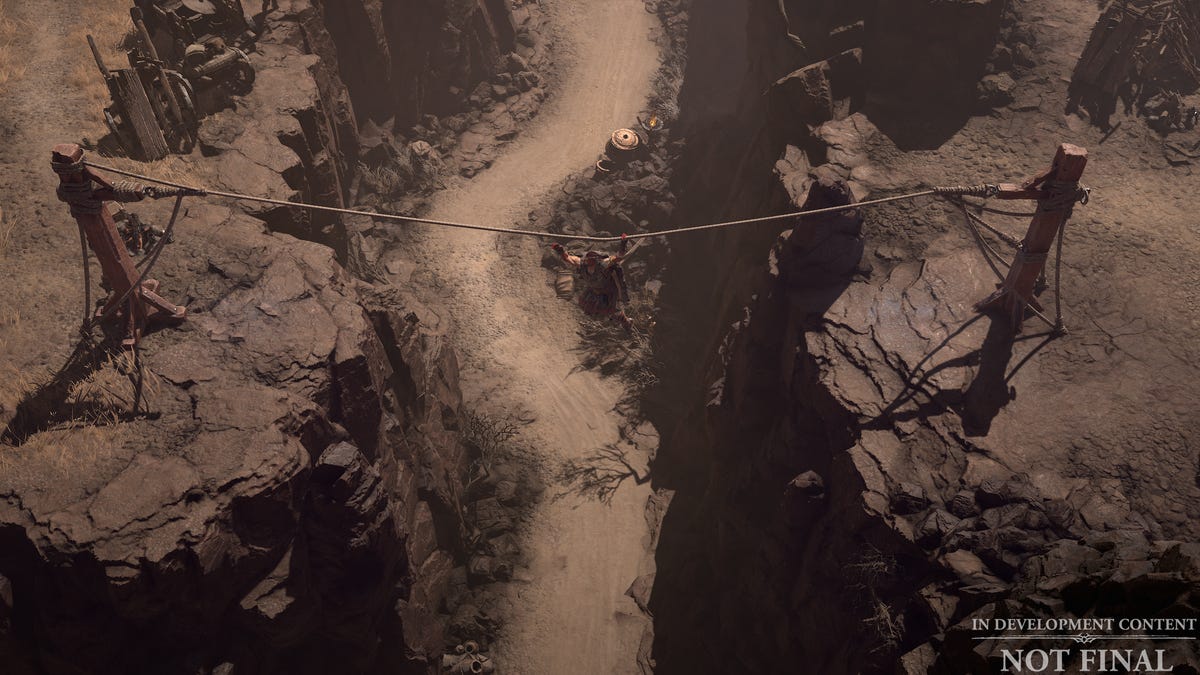
The Diablo series has gone through some incredible highs and more than a few lows.
Games like Diablo II: Resurrected received huge hype when announced but failed to win over fans upon release. Diablo Immortal was ridiculed since day one. Diablo 4, however, is another entry into the series with a lot of buzz, and the developer team has a grasp of the pressure on it as well as the legacy it has to live up to when it comes out on June 6, 2023.
Having spent eight to 10 hours playing Diablo 4 on the Xbox Series X, I can confirm the short amount of time I spent with the game was downright disturbing -- in a good way. The game's "Return to Darkness" tagline is more than a marketing ploy. It heralds a return to the bleak, dark world of Diablo that's been ensnaring gamers since the original's debut back in 1997. In those days having a game with a boss named Diablo was disturbing enough. In 2022, the envelope has to be pushed a bit more.
"When you look at what pop culture is like in the industry, you have Game of Thrones, Walking Dead and Sons of Anarchy," said Rod Fergusson, general manager for Diablo. "These are very dark topics and dark themes that are mainstream. We felt like this was an opportunity to kind of embrace Diablo's roots and bring it to the forefront and make it mainstream as well."
Leading this darker tone is the main antagonist, Lilith. She's the daughter of Mephisto, one of the Great Evils, and is called the Mother of Sanctuary, the world in which the Diablo series takes place. Unlike previous games where there was a slow buildup to the big boss behind all the evil in the world, Blizzard put Lilith up front from the very first cutscene.
When it launches sometime in 2023, Diablo 4 will have five classes available to play: Barbarian, Rogue, Sorceress, Necromancer and Druid. Since the Necromancer wasn't available, I went with the Barbarian to get a feel of the melee combat and how dynamic it is. It's also one of the classes I've played the most in the series.
The playable build starts off at Fractured Peaks with my hero's horse being killed leaving him in a cave by himself for the night. From the caves came the first stop, Nevesk, a very small town where things aren't what they seem. Lilith already had an impact on the few people here, and her true power comes from having people indulge their dark side. This was the first interaction my character had with other NPCs, and it was pretty clear how the developers wanted to give the hero more of a part within the story by having their own dialogue and playing a part in the cutscenes.
It's in the town of Nevesk where Lilith's effect on the people of Sanctuary is shown. There's far more to her than just being evil, which sets her as an interesting antagonist when compared with the other Great Evils from previous Diablo titles. While her ultimate plan isn't apparent early on, Lilith's presence is immediately felt and was done deliberately so by the development team.

Lilith in all of her glory.
Blizzard Entertainment"By having you unravel her story about what's happening, her impact on the world, you get to hear her motivations," said game director Joe Shely. "You get to understand what she's trying to do and you get to get more connected to her and maybe there's even a little bit of ambiguity there where you're like: watch Star Wars and go like maybe Vader was right. I think that notion of having more face time with with the big bad means that it's a much more satisfying resolve as you play through the story, as you go through it."
Diablo 4 doesn't stray from the hack-and-slash action the series is known for, but movement feels more fluid and active thanks to the evade move. First introduced in Diablo 3, the evade button feels more integrated into the sequel. Certain enemies telegraph attacks, allowing the player to dart away in response. The developers say as the players level up, other options to evade, such as being able to pull off multiple dodges at a time, can be unlocked.

The sorceress blasts beautiful fire onto a montser.
Blizzard EntertainmentThe skill tree in Diablo 4 has also evolved. As someone who played all the Diablo games, that took a bit of getting used to. The options available grant players freedom to customize for specific playstyles, but won't leave newbies feeling confused. As a Barbarian, I could focus on dual-wielding weapons for quicker attacks that deal more bleed damage or go with a two-handed slashing weapon in order to perform a spinning attack that lets me carve through huge groups of enemies. The tree looked like a buffet of attacks, but there was a logic to it all as it was in previous Diablo games.
As expected in a Diablo game, there are plenty of dungeons to clear in Diablo 4. but the game's new open world adds a layer of complexity to the proceedings. I was surprised when I came across a cliff and there was an option to "climb down" leading to another part of the map.
While there isn't an extensive, vast open world like Elden Ring or The Legend of Zelda: Breath of the Wild, it was interesting to have a broader land to explore. Previous Diablo games had procedurally generated maps that were big, yet limited. While Fractured Peak was still restricted, it didn't feel like I was bound to a map. There are horses available to purchase but only after you complete a quest that is available later on.

Sanctuary got a little bigger in Diablo 4.
Blizzard EntertainmentIn the time I played the build, I found myself compelled by Diablo 4's story as well as how it played, which isn't what I felt in Diablo 3 where it was the gameplay that kept me coming back but the storyline was quickly forgotten. Combine that with an open world and I was even more enticed to explore while also seeing how I can build my Barbarian. It's that combination of story and gameplay that makes what I played of Diablo 4 so interesting and should be the same for fans when it comes out.
Diablo 4 will release on the PC, PS5 and Xbox Series X|S.









 Add Category
Add Category